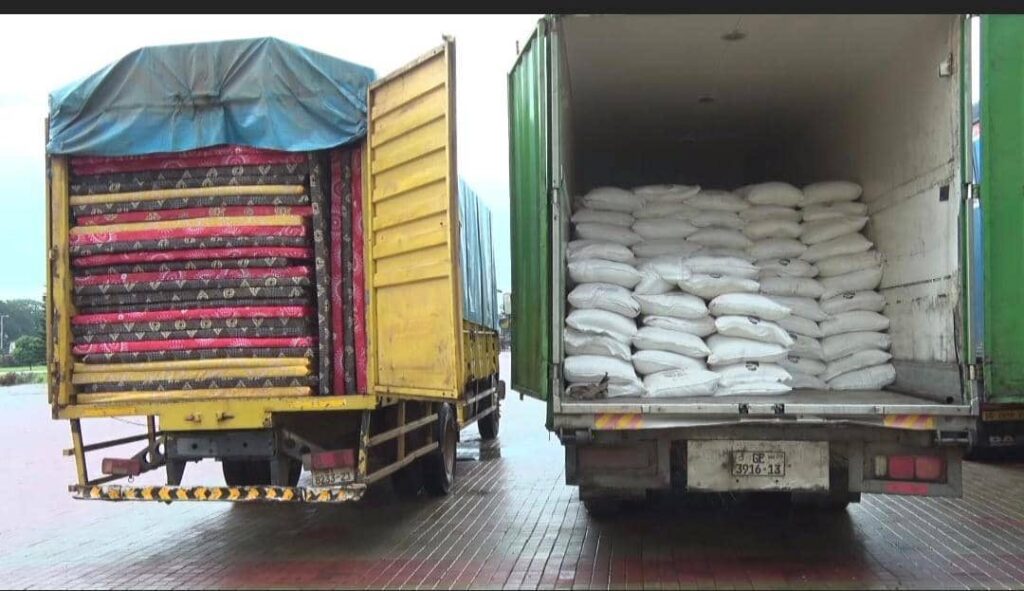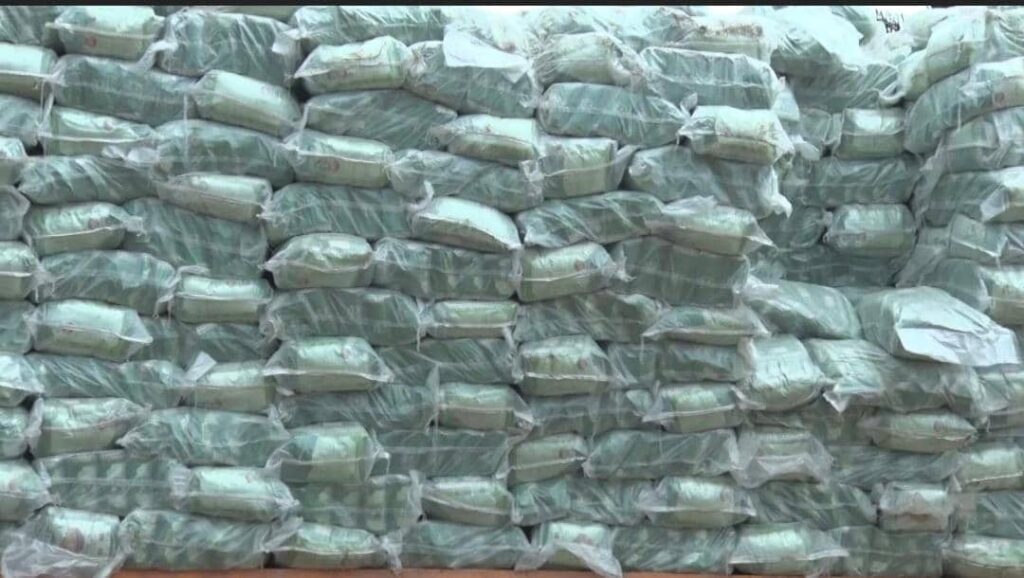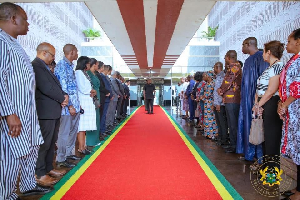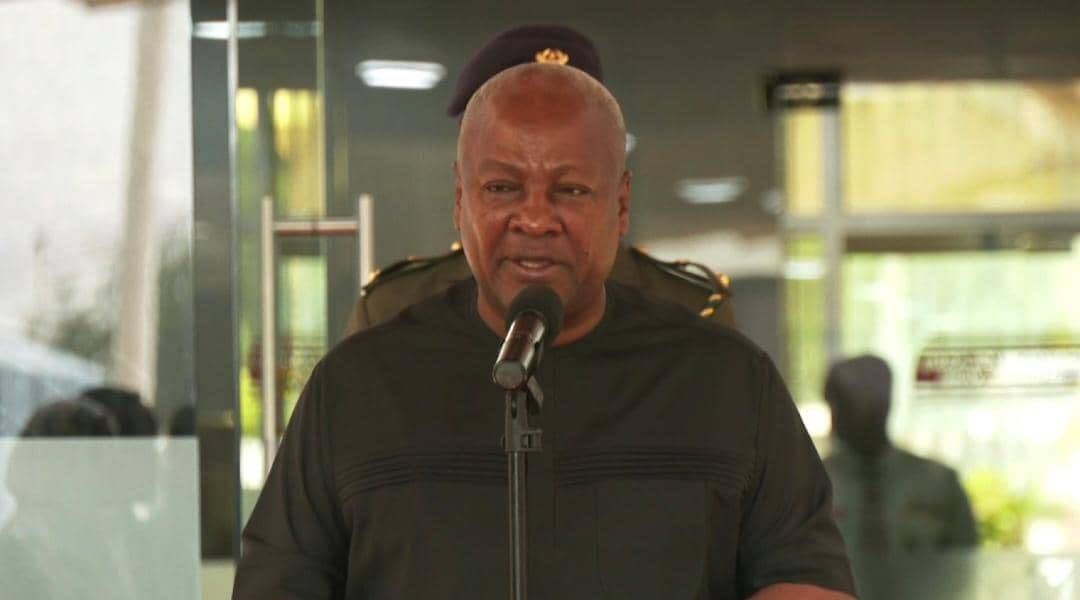President John Dramani Mahama has appealed to African nations to unite and mobilize collective support for countries recently devastated by a powerful hurricane. The call comes as Ghana delivers a humanitarian package valued at GH₵10 million to assist disaster-stricken Jamaica and Cuba, alongside relief aid to conflict-hit Sudan.
The donation—comprising food, household items, and essential supplies—is part of Ghana’s broader foreign policy focus on regional solidarity and humanitarian diplomacy. According to the Office of the President, the gesture underscores Ghana’s commitment to extending a helping hand beyond its borders, especially in times of crisis.
The relief package sent to the Caribbean includes staples such as rice, gari mix, and cocoa-based food products, as well as mattresses, plastic water tanks, and other emergency supplies. Officials said the items were mobilized through the Ministry of Foreign Affairs and Regional Integration in partnership with the National Disaster Management Organisation (NADMO).
The aid aims to support thousands of people displaced or affected by the hurricane that tore through sections of Jamaica and Cuba earlier this month, leaving homes destroyed, crops flattened, and infrastructure severely damaged. Both island nations are still counting losses and working to rebuild essential services like power and water supply.
President Mahama said Ghana’s intervention—though modest compared to the scale of the destruction—represents an important act of African solidarity. “Ghana has a tradition of compassion and collective responsibility,” he noted. “While our support may not completely address the humanitarian suffering, we believe that when every nation contributes its share, we can help to ease the pain of those affected.”

In addition to the Caribbean support, part of the GH₵10 million package has been earmarked for Sudan, which continues to grapple with humanitarian challenges linked to protracted conflict and displacement. The contribution will go toward emergency food and medical relief for affected civilians, particularly women and children in temporary camps.
Ghana’s involvement in Sudan’s humanitarian efforts reflects Accra’s longstanding commitment to African peace and cooperation. Over the past decade, Ghana has contributed troops and logistical assistance to United Nations and African Union missions in Sudan and South Sudan. The new aid reinforces that diplomatic tradition with tangible support for civilians.
Ghana’s recent relief efforts carry both moral and strategic significance. As climate-related disasters and conflicts increase across the globe, African nations are being called to take greater responsibility in shaping international humanitarian responses.
Experts say Mahama’s call for collective action represents an important shift in how African states engage with global crises—not just as recipients of aid but as active contributors to global resilience. This approach, analysts argue, strengthens Africa’s diplomatic voice and reinforces a message of self-reliance and mutual support.
The gesture also enhances Ghana’s international image as a nation committed to peace, solidarity, and multilateral cooperation—principles that have guided its foreign policy since independence.
Africa’s Growing Role in Humanitarian Diplomacy

Recent years have seen several African countries step up their humanitarian engagement on the global stage. Nigeria and South Africa, for instance, have contributed relief funds to flood-affected nations in Asia, while Kenya and Rwanda have dispatched peacekeepers and medical supplies to countries recovering from natural disasters.
Ghana’s contribution to the Caribbean marks another example of South-South cooperation—an emerging trend where developing nations share resources, expertise, and support without reliance on traditional Western donors.
In 2021, Ghana also extended assistance to Guinea and the Democratic Republic of Congo following devastating floods and epidemics. Similarly, after Japan’s 2011 tsunami, Ghana symbolically donated cocoa products as a gesture of friendship. President Mahama referenced these examples, emphasizing that the latest donation continues that legacy of global compassion.
While the relief initiative has drawn international praise, it has also sparked local debate. Some Ghanaians have raised concerns about domestic needs, especially given recent flood damage in parts of Accra and Kumasi. Others, however, see the move as an investment in Ghana’s international reputation and a reaffirmation of its moral leadership.
Political analyst Dr. Selorm Amegashie noted that humanitarian diplomacy often serves dual purposes—providing assistance while strengthening diplomatic ties. “Such gestures improve Ghana’s standing globally and open doors for stronger economic and cultural cooperation in the future,” he said.
According to NADMO data, Ghana spends an average of GH₵250 million annually on domestic disaster response, highlighting that the nation continues to balance its internal needs while maintaining an active global humanitarian role.

Hurricanes and extreme weather events have become more frequent and intense due to climate change, with developing countries bearing the brunt. Caribbean nations like Cuba and Jamaica have long been vulnerable to tropical storms, while African nations face parallel challenges such as droughts, floods, and rising sea levels.
By standing with other vulnerable nations, Ghana’s aid initiative reinforces the call for shared responsibility in global climate resilience. It also strengthens partnerships between Africa and the Caribbean—two regions linked by history, culture, and shared development aspirations.
Ghana’s GH₵10 million relief donation may be small in financial terms, but its symbolism is significant. It embodies a message of unity, compassion, and responsibility in a time of global uncertainty. As disasters increase in scale and frequency, Mahama’s call for African solidarity reminds the continent that resilience begins with cooperation—both within Africa and beyond.
Read also: Heavy Friday downpour floods parts of Accra, traffic gridlock underscores drainage crisis

